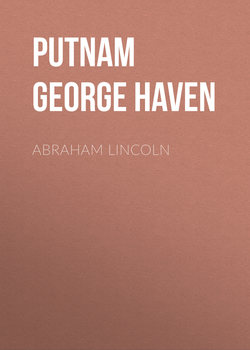Читать книгу Abraham Lincoln - Putnam George Haven - Страница 1
INTRODUCTORY NOTE
ОглавлениеThe twelfth of February, 1909, was the hundredth anniversary of the birth of Abraham Lincoln. In New York, as in other cities and towns throughout the Union, the day was devoted to commemoration exercises, and even in the South, in centres like Atlanta (the capture of which in 1864 had indicated the collapse of the cause of the Confederacy), representative Southerners gave their testimony to the life and character of the great American.
The Committee in charge of the commemoration in New York arranged for a series of addresses to be given to the people of the city and it was my privilege to be selected as one of the speakers. It was an indication of the rapid passing away of the generation which had had to do with the events of the War, that the list of orators, forty-six in all, included only four men who had ever seen the hero whose life and character they were describing.
In writing out later, primarily for the information of children and grandchildren, my own address (which had been delivered without notes), I found myself so far absorbed in the interest of the subject and in the recollections of the War period, that I was impelled to expand the paper so that it should present a more comprehensive study of the career and character of Lincoln than it had been possible to attempt within the compass of an hour's talk, and should include also references, in outline, to the constitutional struggle that had preceded the contest and to the chief events of the War itself with which the great War President had been most directly concerned. The monograph, therefore, while in the form of an essay or historical sketch, retains in certain portions the character of the spoken address with which it originated.
It is now brought into print in the hope that it may be found of interest for certain readers of the younger generation and may serve as an incentive to the reading of the fuller histories of the War period, and particularly of the best of the biographies of the great American whom we honour as the People's leader.
I have been fortunate enough to secure (only, however, after this monograph had been put into type) a copy of the pamphlet printed in September, 1860, by the Young Men's Republican Union of New York, in which is presented the text, as revised by the speaker, of the address given by Lincoln at the Cooper Institute in February, – the address which made him President.
This edition of the speech, prepared for use in the Presidential campaign, contains a series of historical annotations by Cephas Brainerd of the New York Bar and Charles C. Nott, who later rendered further distinguished service to his country as Colonel of the 176th Regiment, N.Y.S. Volunteers, and (after the close of the War) as chief justice of the Court of Claims.
These young lawyers (not yet leaders of the Bar) appear to have realised at once that the speech was to constitute the platform upon which the issues of the Presidential election were to be contested. Not being prophets, they were, of course, not in a position to know that the same statements were to represent the contentions of the North upon which the Civil War was fought out.
I am able to include, with the scholarly notes of the two lawyers, a valuable introduction to the speech, written (as late as February, 1908) by Judge Nott; together with certain letters which in February, 1860, passed between him (as the representative of the Committee) and Mr. Lincoln.
The introduction and the letters have never before been published, and (as is the case also with the material of the notes) are now in print only in the present volume.
I judge, therefore, that I may be doing a service to the survivors of the generation of 1860 and also to the generations that have grown up since the War, by utilising the occasion of the publication of my own little monograph for the reprinting of these notes in a form for permanent preservation and for reference on the part of students of the history of the Republic.
G.H.P.
NEW YORK, April 2, 1909.
